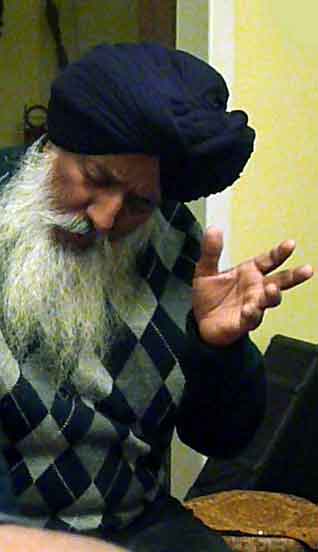Music
The Sikh-Sufi Bard:
Madan Gopal Singh
JASKIRAN KAPOOR
Madan Gopal Singh has been reading, reciting, translating and singing Sufi poetry for years now. At the same time he has been telling the world that he is not a Sufi -- he is a Sikh!
“I hold a PhD in cinema for starters. I am not a trained singer and I have this reluctance to identify myself exclusively with Sufi music,” said the lyricist, composer, film the arist and singer.
Madan Gopal performed on Saturday evening (September 12, 2015) with his group ‘Chaar Yaar‘ (Four Friends), in Chandigarh, Punjab, for the ongoing three-day Sufi Sangeet Festival organised by the Chandigarh Sangeet Natak Akademi at the Tagore Theatre. He shared how he was a child of the late sixties, hugely influenced by the movements and music of that time.
“The Beatles, Bob Dylan, the Vietnam War, student protests and then chasing the subcointinent’s music genres, following the greats like Pandit Kumar Gandharva, Pandit Mallikarjun Mansur, Tufail Niazi, Pathane Khan, Salamat Ali …” said the stalwart who also wrote a film on Pandit Mallikarjun Mansur which went on to win the President’s Award for the best short film in the mid-nineties.
Among his latest works, Madan Gopal gave the dialogues and lyrics for Anup Singh’s award winning film, Qissa, and is working on Anup’s next. There is a trilogy of albums in the pipeline titled ‘Sakhiya‘, part one of which will be released soon.
“This one has a lot of Kabir in it, a first for me too,” he said. Thus, he ‘s constantly working on old text and new sounds.
A voracious reader who has translated works of poets including Brecht, Neruda and Lorca, even The Beatles and John Lennon, and Simon and Garfunkel, Madan Gopal said the USP of Chaar Yaar is to sing these translations in Hindi, Urdu and even Punjabi that make them unique in their own right. Though he personally rates poetry quite high, he feels the poetry of resistance is missing in today’s times.
“Don’t get me wrong. I embrace change. While the past can be interesting, I am not stuck in a fetishized nostalgia. Having said that, I do feel that no one is penning strong words. All we hear is this celebration of a peasant (‘jutt‘) myth, of singers who are more of style statements on stage than substance. Your body is a container of your soul, and if that is not right, your soul will be damaged too,” he said.
He asserts how Sufi music cannot be disassociated from its Islamic roots and that to practice it is to hone the art of hafza, of singing it by heart.
“So much of our energy is wasted on referring notes … true Sufi music is about reciting it loud, memorising it, aligning this memory with the rhythm of your body and soul, singing it and feeling the presence of someone, being overwhelmed by it and finally letting the self, song and presence become one. How many singers have been able to do that in today’s time?” he asked.
He agreed Sufi music has gone through much change, from simple taali and tabla to addition of harmonium, and in his group, guitar and sarod.
“Guitar is the most democratic of instruments. It’s difficult yet it makes people pick it up and strum, achieve an intimacy and sense of empowerment. Sarod, on the other hand, is an instrument with an ego, demanding great deal of learning before allowing you to access it. The combination of these two brings alive our music on stage,” he said.
A self-taught musician, he credits most of it to growing up in Amritsar, waking up to the music from the Gadara and tuning into Radio Pakistan, Station B, Lahore for Punjabi and Urdu songs.
“Sufi music is a sight of seduction and not many are serious about it. For me, it’s about singing something that interprets me, that involves you and makes you get up and sing along and dance,” he said.
[Courtesy: Indian Express. Edited for sikhchic.com]
September 14, 2015



